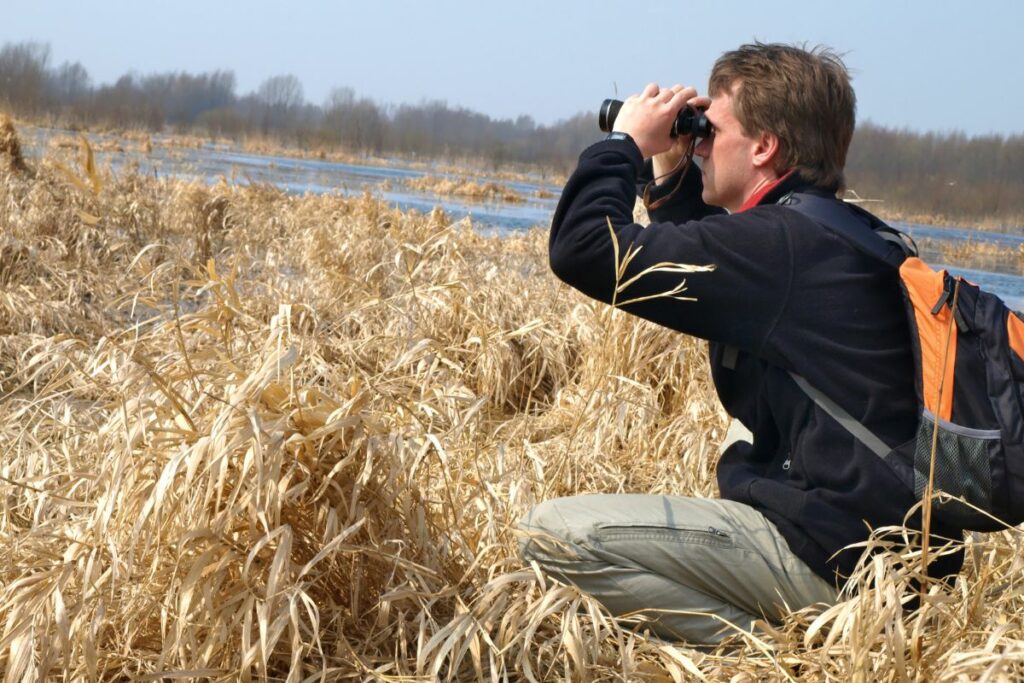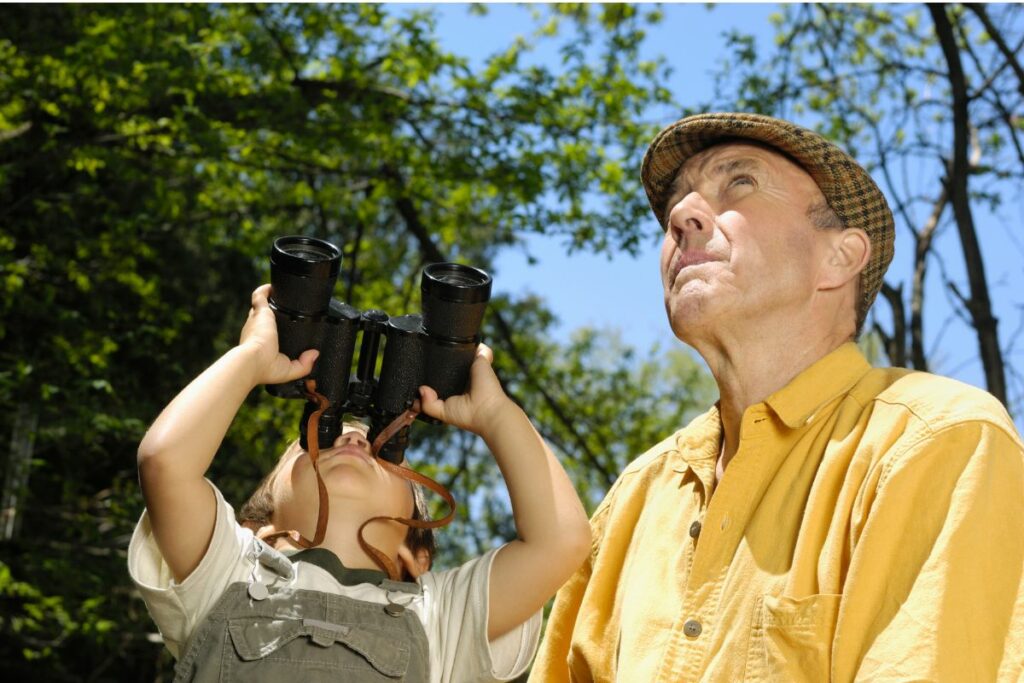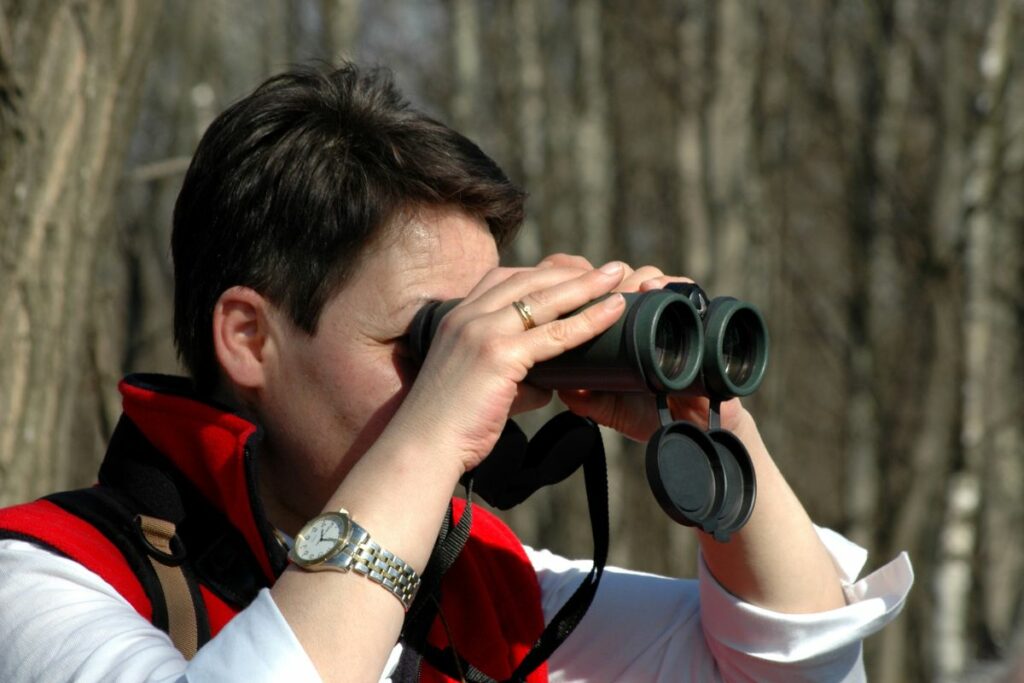As an Amazon Associate, we earn from qualifying purchases with no additional costs for you.
Many people bird watch regularly all over the world, but some people don’t bird watch and who may think that bird watchers are weird. After all, who would think that getting up early on a Sunday to go bird watching at a smelly wastewater treatment plant would be fun?
Bird watchers are not weird. Birdwatching is a healthy hobby that has physical and mental benefits and can be engaged in by people of all ages and physical abilities. Millions of people engage in birdwatching, and it is far more popular internationally than most people realize.
Bird watchers are not weird, though; they are simply people who have found a fun, relaxing, and healthy hobby. Bird watching is a great way to get physical exercise while learning about the natural world. It is also mentally challenging, and millions of people bird watch.
TIP: If you want to check out the best pair of binoculars for bird watching, we recommend a pair of waterproof and fog-proof 8 x 42 binoculars like the Celestron – Outland X 8×42 Binoculars (Amazon link).
Why Do People Become Bird Watchers?
There are several reasons why a person may become a bird watcher. It could be that the child is raised in a home that loves nature and the parents introduce the child to bird watching.
Some people like to spend time outside in nature and, in the process, they may simply become curious about the natural world. Since birds are highly visible animals, the person may naturally want to learn more about what they are seeing and hearing while outside.
People may be concerned about nature conservation and take up bird watching to learn what birds are around so that they can plan ways to help conserve the birds.
Scientists Who Study Birds
Still other people like to study the natural world in a scientific fashion. They like to do research where they form hypotheses, collect data, analyze data, and draw conclusions about patterns they see. Such people may aspire to become an ornithologist.
An ornithologist is a person who studies birds. Ornithologists naturally become bird watchers as part of their career and while studying the specific bird or birds they are interested in.
Another part of ornithology involves bird ringing (sometimes called bird banding). This is when birds are caught in mist nets and then fitted with a ring after several measurements of the bird are taken. Measurements include beak length, wing length, and body weight.
The sex and condition of the bird are also recorded. Data collected during bird ringing expeditions are scientifically valuable and help to add to the knowledge base of different species.
What Is The Average Age Of Bird Watchers?
The average age of bird watchers is somewhere between 49 to 54 years of age. There are, of course, bird watchers of all ages from young children to the elderly. According to research, in general, though, most people first begin bird watching at about 22 years of age.
One reason the age range is biased towards adults today is also possibly because of technology. It is a sad reality, that many children and teenagers today would rather spend time on their phones than be outside exploring and learning about the natural world.
Bird watching and spending time outdoors is a healthy activity for children and adults alike. It is a great way to exercise both the body and mind.
Fields Guides, Apps, And Bird Atlasing
While paper field guides are still available for bird watchers, numerous phone apps have been developed. This may help to encourage people to take up the hobby since they can still use technology during the process of learning about birds and while bird watching.
Some people atlas while birding. This means they record each species seen or heard within a specific demarcated area.
This information is fed into a database and then used to map out the distribution of each species of bird. This is also a good way to find out if a bird is a vagrant or rare for an area by comparing its occurrence in an area with the distribution maps.
What Type Of People Are Bird Watchers?
All sorts of people become bird watchers. People from all different ethnicities and cultures are interested in birds and bird watching.
Birders come from all ages and income levels. You don’t have to buy expensive binoculars or spend thousands to travel since you can sit and bird watch at home.
Sometimes there is an overlap between aviculturists and bird watching. In other words, people who keep and breed exotic birds may also be equally interested in wild birds in their area.
Ornithologists are people who research birds. This group of people is also usually interested in bird watching for research purposes, but also often as a hobby.
How Many Americans Are Bird Watchers?
There are approximately 45 million Americans who bird watch according to the United States Fish and Wildlife Service. This is quite a large proportion of the population and could partly be due to the large areas of land in the U.S. that are designated as wildlife refuges and state parks.
There are also citizen science projects that have been established by Cornell University. These projects encourage the population to help with nature conservation efforts and have probably helped increase the popularity of bird watching among the general public.
The COVID-19 pandemic is thought to have played a role in increasing interest in bird watching in America and other parts of the world.
Many people found that they were stuck at home because of government restrictions on their movements and activities. This may have led to people starting to bird-watch from home.
There was even a 50% increase in bird food sales during this time, which seems to correlate with an increase in the public’s interest in birds. There were even Facebook groups established where people could report sightings from home and partake in birding-from-home competitions.
Are Bird Watchers Weird?
Bird watchers probably are not any stranger or weirder than any other person. Three reasons why bird watchers are not weird:
- Millions of people bird watch, meaning that it is not that strange or unusual to come across somebody who likes watching birds.
- Bird watching is a healthy hobby that has both physical and mental benefits for people.
- People of any age can bird watch and can even do so from their homes.
Why Bird Watchers May Seem Weird To Others
Some people may think bird watchers are weird because birders have their own birding lingo. Terms like lifer, LBJ, and mega rarity are not things the everyday person hears in the course of a normal conversation.
Birders also may behave quite differently from the average person in terms of what they may think of as normal. For example, bird watchers are happy to get up at sunrise (even in cold weather) to go bird watching on a weekend, while most people probably would want to sleep in.
Early also has an entirely different meaning depending on if you are a bird watcher or not. People who don’t bird watch may think that 8 am is early but to bird watchers this is not early. Rather, a bird watcher thinks that sunrise is early.
Some bird watchers even get up before sunrise to drive to and arrive at a site when it is still dark. This is a good way to see some owls or nightjars before the sun rises.
It is a fact that bird watchers have the best chance of seeing birds if they rise at the crack of dawn and get out in the woods as the birds are waking up and searching for food.
Bird activity is optimal just after sunrise and certain species of birds, like robins and thrushes, tend to be most easily spotted very early in the morning. Birds are also most highly vocal at sunrise as anyone who has heard the dawn chorus knows.
Bird watchers also frequently visit unpleasant places like odorous wastewater treatment plants and abandoned fields, for the sake of finding birds. This can seem bizarre to non-birders who can’t understand why a person would want to visit such places that can be physically uncomfortable.
TIP: Knowing how to spot the birds in your yard is key to enjoying visits from your winged friends as much as possible! The best sources are trusted books, I recommend using the following (Amazon links):
– National Geographic Field Guide to the Birds of North America
– National Audubon Society Birds of North America
Twitching
Another, what some may think of as weird behavior, is that some birders will spend thousands of dollars to fly to an area to look for one particular rare species of bird. It is a large investment of time and money in those cases.
But this is not common for everyone since not every birder can afford to fly to a destination in hopes of seeing a rare bird. You can still find a lot of bird watchers showing up if a rare bird is spotted.
These are often called twitches, named for the fact that twitchers are the type of birders that will most readily visit a place to see a rare bird. Crowds can descend on an area in large numbers in hopes of spotting the rare bird.
Conclusion
Bird watchers are not weird, even though some people may perceive them that way. The fact that millions of people, of all ages, across the world bird watch suggests that the activity is not as rare or strange as some may think.
Bird watching is a healthy and, for most, relatively inexpensive hobby for people interested in nature and the outdoors.
TIP: Knowing how to spot the birds in your yard is key to enjoying visits from your winged friends as much as possible! The best sources are trusted books, I recommend using the following (Amazon links):
– National Geographic Field Guide to the Birds of North America
– National Audubon Society Birds of North America




